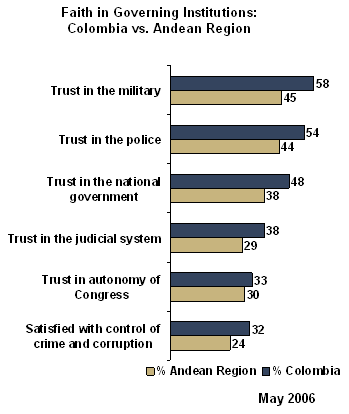GALLUP NEWS SERVICE
PRINCETON, NJ -- The third country visited by President Bush in his five-nation Latin America tour was the United States' strongest ally in the region, as well as the largest recipient of U.S. assistance in Latin America's recent history. Colombia has received considerable attention in recent years from U.S. administrations and lawmakers because the country is the world's top producer of illicit drugs and the source of 90% of the cocaine consumed in the United States.
Since the year 2000, Colombia has received $4.7 billion in U.S. aid in support of Plan Colombia and other initiatives to stem the flow of narcotics. Plan Colombia was a five-year strategy launched by Colombian authorities in the late 1990s to strengthen law enforcement and democratic institutions, combat illicit drug trade, and boost economic growth. The plan's results and subsequent anti-narcotic efforts by Colombian President Alvaro Uribe have been consistently praised by U.S. officials.
The Colombian people may be noticing the results as well. Like its neighbors in the Andean region, Colombia has a long way to go in strengthening residents' confidence in government. However, 2006 Gallup World Poll data collected in Colombia and the other Andean nations (Venezuela, Bolivia, Ecuador, and Peru), indicate Colombians rate certain aspects of government and the rule of law more positively than average for the region.
- Nearly 6 out of 10 Colombians express trust in their military and police corps (58% and 54%, respectively). The average rating for the military in the Andean region is 45%, while the average for the police corps is 44%.
- The national government and the judiciary elicit the confidence of 48% and 38% of Colombians, respectively. Again, these figures are higher than the regional averages of 38% and 29%.
- Nevertheless, there appears to be ample room for strengthening the rule of law in Colombia. Only one in three Colombians (32%) are satisfied with the efforts being made to fight crime and corruption, just above the regional figure of 24%.
- Similarly, one-third of Colombians (33%) believe their congress is able to make decisions without undue pressure from other powers. This figure is about on par with the overall regional finding of 30%.

Unfortunately, events preceding Bush's visit have prevented him from highlighting progress in Colombia. Eight pro-Uribe congressmen have been arrested and dozens of others are being investigated for allegedly collaborating with a right-wing anti-guerrilla group accused of murder and drug trafficking.
The arrests highlight concerns raised by Uribe's opposition that human rights have been violated in the implementation of Plan Colombia and subsequent U.S.-supported anti-narcotic and anti-terrorist activities. Though the scandal cast a shadow over Bush's visit, it didn't stop him from pledging to support additional U.S. aid to Colombia. It may have far more important long-run implications, however, if it reduces Colombians' trust in government and erodes Uribe's popular mandate.
Survey Methods
These results are based on face-to-face interviews with a randomly selected national sample of 1,000 Colombians, aged 15 and older, conducted in May 2006. For results based on this sample, one can say with 95% confidence that the maximum error attributable to sampling, weighting, and other random effects is ±3 percentage points for a percentage at 50%. In addition to sampling error, question wording and practical difficulties in conducting surveys can introduce error or bias into the findings of public opinion polls.